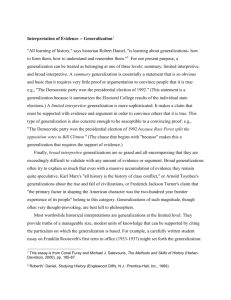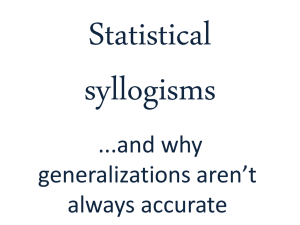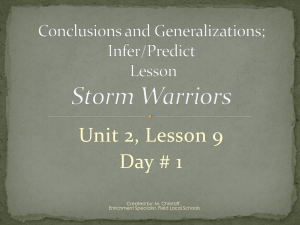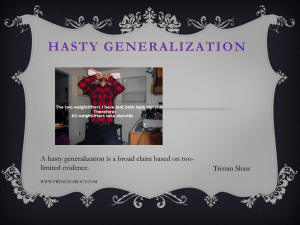Spelling Generalizations
advertisement
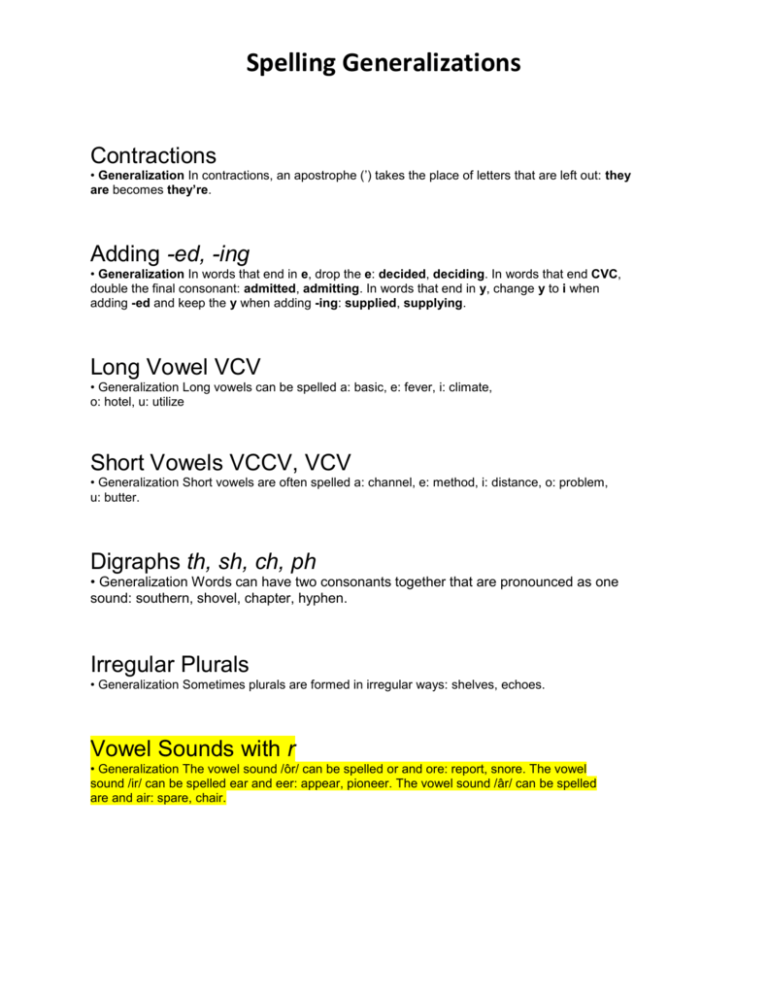
Spelling Generalizations Contractions • Generalization In contractions, an apostrophe (’) takes the place of letters that are left out: they are becomes they’re. Adding -ed, -ing • Generalization In words that end in e, drop the e: decided, deciding. In words that end CVC, double the final consonant: admitted, admitting. In words that end in y, change y to i when adding -ed and keep the y when adding -ing: supplied, supplying. Long Vowel VCV • Generalization Long vowels can be spelled a: basic, e: fever, i: climate, o: hotel, u: utilize Short Vowels VCCV, VCV • Generalization Short vowels are often spelled a: channel, e: method, i: distance, o: problem, u: butter. Digraphs th, sh, ch, ph • Generalization Words can have two consonants together that are pronounced as one sound: southern, shovel, chapter, hyphen. Irregular Plurals • Generalization Sometimes plurals are formed in irregular ways: shelves, echoes. Vowel Sounds with r • Generalization The vowel sound /ôr/ can be spelled or and ore: report, snore. The vowel sound /ir/ can be spelled ear and eer: appear, pioneer. The vowel sound /âr/ can be spelled are and air: spare, chair. Spelling Generalizations Final Syllables -en, -an, -el, -le, -il • Generalization Vowels in final syllables often sound alike even when they are spelled differently: veteran, wooden, cancel, chuckle, fossil. Final Syllables er, ar, or • Generalization Words with final syllables er, ar, and or often sound alike even when they are spelled differently: danger, dollar, tractor. Words with Schwa • Generalization In many words, the schwa in an unaccented syllable gives no clue to its spelling: jewel, factory, garage, tropical. Compound Words • Generalization A compound word is smaller words joined together. Keep all the letters when spelling compounds: water + proof = waterproof. Consonant Sounds /j/, /ks/, /sk/, and /s/ • Generalization The sound /j/ can be spelled g, j, and dge: ginger, journal, dodge. The sound /ks/ can be spelled x: excuse. The sound /sk/ can be spelled sch: schedule. The sound /s/ can be spelled sc: scene. One Consonant or Two • Generalization Many words have two consonants that stand for the same sound: address, committee. Prefixes un-, de-, dis• Generalization When prefixes un-, de-, or dis- are added to words, the base word does not change: uncover, defrost, discourage. Spelling Generalizations Words from Many Cultures • Generalization Many words in English come from other languages and may have unexpected spellings: khaki, ballet. Prefixes over-, under-, sub-, super-, out• Generalization When the prefixes over-, under-, sub-, super-, and out- are added to words, the base word stays the same: overlook, underline, subway, supermarket, outlet. Homophones • Generalization A homophone is a word that sounds exactly like another word but has a different spelling and meaning: cent, sent. Suffixes -ible, -able • Generalization When adding the suffix -ible or -able, there is no sound clue to help you decide which form to use: flexible, agreeable. Negative Prefixes • Generalization When adding prefixes il-, in-, im-, and ir-, make no change in the base word: illegal, invisible, impossible, irregular. All of the prefixes mean “not.” Multisyllabic Words • Generalization When spelling words with many syllables, look carefully at each word part. Related Words • Generalization Related words often have consonants that are spelled the same but pronounced differently: music, musician. • Generalization Related words often have vowels that are spelled the same but pronounced differently: clean, cleanse. Spelling Generalizations Greek Word Parts • Generalization Many words are formed from the Greek word parts -ology, meaning “study of”; phobia meaning “fear of,” -ism meaning “condition of being,” and -ist meaning “person who.” • Generalization Many words are formed from the Greek word parts tele meaning “over a long distance,” photo meaning “light,” meter meaning “measure,” and graph meaning “write.” Latin Roots • Generalization Many words are formed with the Latin roots spec meaning “look,” scrib or scrip meaning “write,” rupt meaning “break,” and ject meaning “throw.” • Generalization Many words are formed with the Latin roots aud meaning “hear,” dict meaning “say,” port meaning “carry,” dec meaning “ten,” and terr meaning “land.” Suffixes -ous, -sion, -ion, -ation • Generalization When adding -ous, -sion, -ion, and -ation, some base words change. A final e or y may be dropped: famous, furious. Some words have other changes: decision. Final Syllable -ant, -ent, -ance, -ence • Generalization There is no sound clue to help you decide whether to use an a or e: important, intelligent, instance, experience. Easily Confused Words • Generalization Some words are easily confused because they have similar pronunciations and spellings: quiet, quite.


